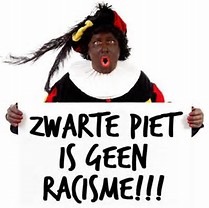There will be national elections in the Netherlands on March 15. Arguably the most important figure is not standing for election, is not a member of any political party, and has been around forever. He is a character called “Zwarte Piet”. Black Peter is traditionally the assistant of Saint Nicholas, the patron of wise children. He is black with rich red lips. He has, till very recently, accompanied the illustrious saint as he goes about his business, helping children. But in 2014 a Dutch authority ruled that “Zwarte Piet” was a racist stereotype that could no longer be permitted in a multicultural society. The PVV, the right wing party headed by Geert Wilders, which is predicted to obtain the highest single share of the vote in the elections, has placed a motion before Parliament seeking to reinstate Zwarte Piet. The country cannot trade away symbols of identity, or try to turn them into something different (the last couple of years have seen the time honored character supplanted by someone based on cheese – whether Gouda, Emmental or otherwise is not too clear). For PVV, removing Zwarte Piet shows all that is wrong with the path followed by Dutch politicians over the years. They have failed to defend the people.
It seems to be open season for the doom merchants. Buoyed by the triumph of Donald Trump, who successfully told the American electorate that things have been going downhill since George Washington but hey, don’t worry, I’m here to save you and what’s more, the foreigners will pay the bill, an astonishing range of European politicians have joined the bandwagon. Profiting from the reverberations of Brexit and the travails of the EU, and capitalizing on the surfeit of key elections scheduled for the coming months, the dark prophets have decided that preaching doom leads to boom (at least for them).
The sermon varies a bit from place to place, but the main verses are found in all the texts. Here they are.
Verse One says that, across the board, things have been getting worse for nationals (unless of course you are Orban, who has been in power for seven years – in that case things have been getting better, though they will be better still once foreigners stop interfering).
Verse Two tells you that the deterioration is entirely (mostly) due to foreigners, usually those close to home, although people from further away can also be a major source of aggravation.
Verse Three states that local politicians have done nothing to stop the rot. Still worse, because they are in the pay of (multinational firms, foreign governments, you name it) and are concerned only to rake off more for themselves, these people have actively contributed to the mess. Hence they must be removed.
Verse Four insists that all international organizations and regional government groups have aimed to establish rules that are designed to serve the interests of those who run them, and make life worse for you. So beware of them.
Verse Five proclaims that the preacher is outside the system (despite the fact that he/she has been in it for decades), understands you, and will remedy the situation by building a system that will protect you and yours, respect your values, and ensure you live happily ever after.
Verse Six asks you to place confidence in the preacher, keep vaunting your views, and be happy that you had the fortune to be born in (insert the name of the country).
So reads the sacred book as provided by a number of politicians in all the European countries with elections scheduled this year (Netherlands, France, Germany, Bulgaria, Czech Republic), plus those with elections due for 2018 (Italy, Hungary, Sweden, Austria, Malta, Slovenia, Latvia, Luxembourg), plus those where elections could well happen sooner than scheduled (Belgium, Greece). Given the differences across Europe, is it really the case that the one thing Europeans now have in common is their plight? What are the arguments to support that affirmation? And are there no chinks of light in this somber landscape?
Let’s start with the economics, since that is also where many things finish. The Western and Southern EU countries have, with few exceptions, been going through a decade of poor economic performance (compared with earlier periods). The key problem everywhere is employment – its availability, its stability, its financial attractiveness, its scope for personal development. That problem has afflicted the large part of the population which, in most countries, is dependent on paid employment for most or all of its income. At the same time, small groups of people have seen their incomes rise, in some instances due to their own entrepreneurial skills, in others due to the operations of financial markets. The question of economic inequality has therefore been perceived as becoming far more acute at just the time when major segments of the population are finding life much harder.
When economic problems have lasted this long, they can hardly continue to be described as “cyclical” or “an enduring crisis”. In the simplest terms, either awful policies have exacerbated an initial, severe, shock, and/or there is a structurally new situation. In the US, Trump claims to be fixing “the policy mess” (though there is little evidence that policy there has been poor, and in fact the current Administration could easily make things worse), while an intense debate rages over the impact that major technological changes will have on economic growth and employment (with Robert Gordon arguing that a new, less favorable epoch has begun, and others suggesting that the innovative technologies will bring more prosperous times back).
So why has there been enduring pain in so many EU countries? It is hard to escape the conclusion that here the policy doctrines have got things wrong. A much better growth trajectory could have been secured with more sensible policies. Of course that does not mean that all the pain would have disappeared. In a world of continuous, disruptive technological change, additional growth will rarely (if ever) allow a country to recover quickly all the employment under threat. But if you are quick on your feet, and macroeconomic policy does not squeeze growth (which is unfortunately what it has done in a large number of EU countries), then plenty of employment opportunities are there. For instance, Germany reckons it requires a labor force capable of filling at least 750,000 informatics related jobs between now and 2020.
The upshot is that the doom sayers can claim that one of their verses, that attributing fecklessness to the politicians, rings true. Yet that is a far cry from accepting that the preachers themselves have the remedy. They in fact hardly ever debate the points just raised. Instead, they claim that the woes suffered are because politicians did not favor nationals, and national products, and instead permitted foreigners to take national jobs, directly via immigration and indirectly via imports. So, oddly enough, the crucial issue of austerity policy scarcely figures in the mantra of the preachers. For the producers of verses, national policy makers should act against immigration and trade – what they do with regard to monetary and fiscal matters is strictly of second order importance.
There are signs – after more or less a decade of woe (the number of years depending on the country in question) – that things are improving in some countries. Ireland has been on the upswing for a while, Spain is starting to improve, and Portugal may be better. That still leaves a couple of the EU’s largest countries, France and Italy, in the midst of decline, while Greece has its own special position. But each case is different. Both France and Italy can take their economic destiny in their own hands. The task is far easier for France since, for all of its institutional rigidity, it has sufficient economic muscle to turn the tide. Italy is tougher, because the extent of corruption and organized criminality is so great that discussion of economic policy ceases to have much meaning.
In most countries there is plenty of evidence of people launching start-ups, of family and small businesses operating well, and of a fast growing recognition that the wave of technological change offers plenty of possibilities for capturing new markets. Even in the programs (such as they are) of the French presidential election candidates, there is recognition of the possibilities. Melenchon and Hamon both give plenty of importance to the prospects for new types of economic development using ecological approaches. Macron is more conventional, yet still places emphasis on start -up potential in France. It is only on the right, as represented by Fillon and Le Pen, that black painters are in view. In Germany, both of the main candidates for Chancellor share the view that the “4.0” challenge has to be met. That view recognizes that Germany can have a strong economic future provided it embraces technological change, and trains its workforce to use the new instruments that digitalization offers.
To summarize the economic picture. There has been close on a decade of poor economic policy, driven largely by dogmatism. The chief preachers of dogma have been located in countries which themselves were not the sufferers of austerity. That poor policy has imposed major social as well as economic costs on large numbers of people, and those costs continue to be felt. But even the effects of bad medicine start to wear off – iatrogenesis has its limits. So the blackness of the economic picture will slowly fade.
The second dimension of black is said to be the cultural. This is a polite term for the populist complaint that large scale immigration is wrecking the fiber of the country. Politicians again are to blame, this time for bending every which way to accommodate the wishes of the immigrant communities. To return to Holland, another Dutchman, Pim Fortuyn, argued at the beginning of the century that there was an imminent danger that, instead of immigrant populations adjusting to Dutch values, the Dutch would cede to the external pressure. On the basis of what was in fact a quite sophisticated line of argument, he suggested that successful integration depended on establishing a proper balance of values across communities, and said that the balance would be far harder to achieve if immigration was massive.
The experience of the last couple of years has tended to support the Fortuyn thesis. But again there is a total disjoint between where the problems have occurred and where the black painters have operated. Germany, Italy and Greece are the countries where immigrant numbers have been massive. The former accepted major inflows until roughly one year ago, when its policies started to alter. Italy and Greece have been the points of entry, and continue to suffer severe problems in coping with the numbers. Yet in none of these three countries has the demagoguery against migrants been very noticeable. On the contrary, the fiercest denunciations of immigrants have been in France (where there are very real problems but these date from decades ago, not from now); in Central European countries (where you have to search pretty hard to find more than a thousand or two refugees); and in the UK, where the verbal (and occasionally physical) assaults have been directed not at refugees from other continents but at Caucasian and Slavic workers.
Is Europe confronting Huntington’s civilizational clash? The answer is “no”. What it does face is a different type of problem, namely coming to grips with the fact that the continent may have to practice what it has long preached, namely the values of tolerance, respect for others. While Europe has always harped at the US for its claim of “exceptionalism”, the continent never seemed to notice that it too was vaunting a kind of exceptionalism, the kind that used “soft power”, that relied on gentle (mostly) diplomacy, and that sought compromise. The recent events with migrant flows have brutally destroyed that myth. Europe was exceptional only while it could afford to be. Once the push came to shove, the arts of “old fashioned” diplomacy returned to center stage.
Is the “return to reality” a cause for being in somber mood? Again the response is negative. Europe (or at least parts of it) has for centuries been in the forefront on so many dimensions of global change. That sense of setting the standards was transferred over to a similar concern on the humanitarian side (even if, in the context of history, the humanitarian effort was driven for some time by the imperative need to cope with massive problems that Europeans themselves had caused, at home and abroad). The concern was laudable, and for several decades yielded results. The fact that now the continent has been brought back to earth, so to speak, by the scale of today’s problems and the realization that Europe cannot manage them, should not be seen as a bad thing. Nor should it be seen as a reason to turn our backs on the values – the old adage about not throwing out the baby with the bathwater applies. Instead, current events should help to explore alternative routes for dealing with issues.
From at least the epoch, one hundred years ago, of Ragtime, popular music has acted as a measuring rod of social change, and frequently offered sage words to help us understand what is going on. At end 2016 Bob Dylan was awarded the Nobel Prize for Literature. The title of arguably his most famous song, “Times they’re a’changin”, could hardly be more apt today than it was half a century ago at its birth. Alongside the famous American singer, that same period witnessed the eruption onto the music scene (which they have never since vacated) of the English group “The Rolling Stones”. They too propounded pearls of wisdom in one of their great songs “Paint it Black”. Above all they sounded the cautionary note, “Maybe then I’ll fade away and not have to face the facts, It’s not easy facing up when your whole world is black”. Those now seeking to daub Europe’s land with black are not looking at the facts. We may not be in the pastel brilliance of the impressionists, nor yet able to comprehend the new ways of seeing provided by latter-day cubists. But the canvas does have far more colors than black.





